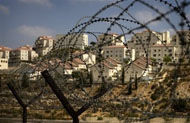This week, the gloves came off for Israeli Prime Minister Benjamin Netanyahu in the months-long tension between his government and the United States over the latter's demand for a settlement freeze in the West Bank and east Jerusalem. On September 4, the Israeli premier said he may agree to a temporary moratorium on further settlement construction but only after he approved some 2,500 houses under construction at present.
The announcement was a clear snub to US demands under President Barack Obama, who has clearly stated that settlement construction must stop for peace talks to move forward. Following Netanyahu's announcement, the White House released a statement, saying Washington "regretted" Israel's plans.
"We regret the reports of Israel's plans to approve additional settlement construction," a White House statement said. "Continued settlement activity is inconsistent with Israel's commitment under the road map."
According to the statement, President Obama "does not accept the legitimacy of continued settlement expansion and we urge that it stop. We are working to create a climate in which negotiations can take place, and such actions make it harder to create such a climate."
President Mahmoud Abbas also had strong words for Netanyahu from Paris. "What the Israeli government said [about the planned construction] is not useful. It is unacceptable for us. We want a freeze on all settlement construction," he was quoted as saying.
This new announcement may put quite a damper on reported plans for a trilateral meeting on the sidelines of the UN General Assembly on September 23. Reports have been circulating about a possible Israeli-Palestinian meeting under US auspices to announce the restart of elections although no reports have been confirmed this yet.
Meanwhile, US Middle East Envoy George Mitchell is scheduled to arrive in the region on September 9 for a 10 day visit in a bid to further efforts that would allow for a resumption of peace talks. It is unclear whether he will confront Netanyahu on his plan to continue construction in the settlements.
There was one Israeli-Palestinian meeting this week though. On September 2, Palestinian Minister of Economy Bassem Khoury met with his Israeli counterpart Silvan Shalom in Jerusalem, ostensibly to discuss technical issues between the two parties in the context of the joint economic committee. Khoury, who came under fire from some Palestinians, including Hamas, insisted that the meeting carried no political significance nor signaled any change in the PA's position of refraining from talks until Israel abides by its roadmap commitments on a total settlement freeze. Rather, he said the two talked about matters such as increasing imported meat to the Palestinian territories to alleviate the hiked up meat prices.
Meanwhile, on September 2, Israeli prison authorities released nine members of Hamas' Reform and Change Bloc in the PLC after they each served 40-month sentences. There are still 23 Hamas PLC members in Israeli prisons to date, including seven serving administrative detention sentences and 16 who are serving various prison sentences.
Unfortunately, their release has not brought Hamas and Fateh any closer to reconciliation. On September 5 both Khaled Meshaal, Hamas' politburo chief, along with a Hamas delegation was expected to arrive in Cairo for talks with Egyptian officials including Intelligence Chief Omar Suleiman. President Abbas is also scheduled to meet Egyptian President Husni Mubarak that same day. There are no plans, however, for the two leaders to sit down together.
One major rift between Hamas and Fateh is President Abbas' insistence that presidential and legislative elections would be held at the beginning of next year. On September 2, Hamas leader Ismail Haniyeh said no elections could take place without Gaza, which meant no elections without reconciliation.
On the ground, the Israeli occupation remained palpable in everyday Palestinian life. On Friday, September 4, approximately 3,000 Israeli policemen and border guards were deployed throughout east Jerusalem, concentrated mostly around the Old City's Al Aqsa Mosque. On the second Friday in Ramadan, Muslims flocked to the holy city to perform noon prayers at the mosque, with Israeli authorities allowing Palestinian men above 50 and women above 45 to enter Jerusalem without a permit. There were several checkpoints set up and routine checks of ID cards on the way to Al Aqsa, but no major clashes were reported.
Also on September 4, one Palestinian and one Israeli journalist were wounded in the West Bank village of Nilin during its weekly protest against the separation wall. On September 2, three people including one child, were injured in Israeli shelling in the Gaza Strip town of Beit Hanoun.
A day earlier, two members of Hamas' military wing, Izzedin Al Qassam Brigades were killed in Israeli artillery shelling east of Jabaliya. In the West Bank, 15-year old Mohammed Nayef from the Jalazoun Refugee Camp was shot and killed by an Israeli soldier in the nearby settlement of Beit El.
Finally, an announcement from Israeli Education Minister Gideon Sa'ar on August 30, proves that the struggle is not only on the ground but in schools as well. Sa'ar announced that the phrase Nakba, or "catastrophe" will be struck from textbooks as of the start of the new year. Al Nakba is used by Palestinians to describe the loss of part of Palestine in the 1948 War, the expulsion of hundreds of thousands of its people and the subsequent creation of Israel.
"What Israeli Arabs experienced during the [1948 War of Independence] was certainly a tragedy," Sa'ar said. "But the word 'Nakba,' whose meaning is similar to 'Holocaust' in this context, will no longer be used. The creation of the State of Israel cannot be referred to as a tragedy."








